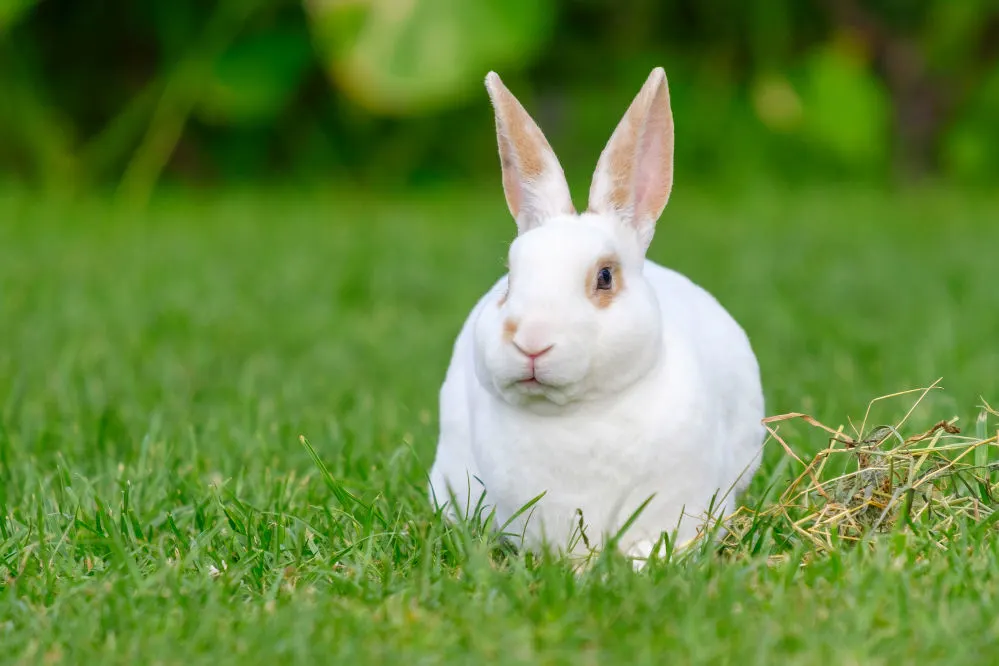Sweet potatoes are delicious for humans. They are a good source of dietary fiber and are considered a generally healthy food. But can rabbits eat sweet potato, and should they? The answer might surprise you.
Sweet potatoes (not to be confused with yams) are a popular root vegetable high in vitamin A. Some insist that they are healthier than regular cooked or raw potatoes. For humans, the sweet potato benefits are many: They are rich in antioxidants, assist in repairing cells, and are rich in fiber.
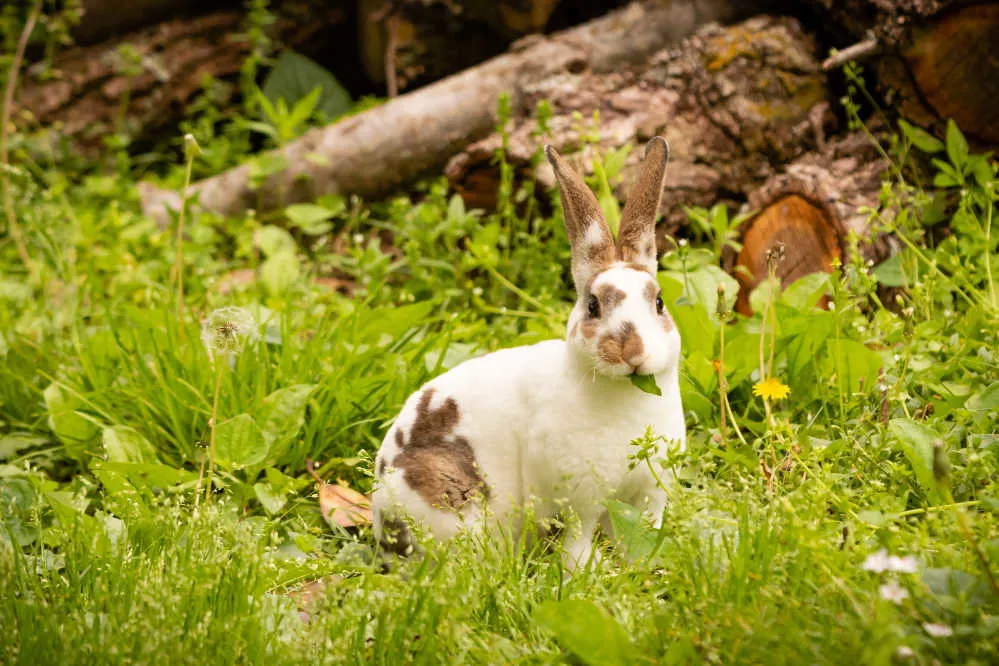
But is this the same for your bun-bun? Unfortunately, the short answer to the question is that although they are non-toxic to your bunny, they are not recommended to eat. As a pet owner, it’s essential to understand why you should not feed your rabbit sweet potato.
What is an ideal rabbit’s diet?
In the wild, rabbits eat mostly hay, fresh green leafy items, and small amounts of vegetables and fruits. They are classified as grazers, meaning they will likely try a taste of anything edible in their path. The same applies to indoor rabbits.
Therefore, it’s not recommended to put random bits of food (especially cooked or baked foods) in their vicinity. Chances are they will take a bite, and if they like it, they will eat it.
Around 80 to 85% of your fluffball’s diet should contain fresh hay. Domestic pet rabbits can also eat commercially available rabbit pellets. Occasional small pieces of raw fruit or veg may be offered, provided it isn’t harmful. Try to keep this component down to about 10% of their diet.
The kinds of vegetables rabbits can eat include carrots, broccoli greens, celery, and watercress.
Will a rabbit eat sweet potato?
Anecdotal evidence strongly suggests that rabbits happen to absolutely love the taste of sweet potato. That does not mean that this starchy food is good for them. Think of it like your favorite fast food. Yes, it’s tasty, and you love eating it, but it’s not exactly healthy.
Here’s another little-known but fascinating fact about sweet potatoes. They can be eaten raw. Regular white potatoes contain an enzyme called solanine which is potentially dangerous. They also taste pretty yucky when uncooked.
On the other hand, sweet potatoes do not contain this enzyme and can be eaten raw; some people have recommended using raw sweet potatoes in smoothies. Again, this is meant for humans only and not for rabbits.
Can a rabbit eat raw sweet potatoes in small amounts?
So, what happens if your furry friend chances upon a piece of sweet potato? Accidents happen; after all, no judgment! First, it may not be a crisis, especially if only a tiny amount.
If your rabbit has accidentally found a piece of sweet potato and munched on a small amount, chances are it will not suffer from any problems. After all, it is likely to find that sweet potato quite tasty.
You must closely monitor your rabbit to see if it shows any signs of discomfort or illness. If its stool looks unusual, it stops passing it altogether, or the rabbit shows signs of distress, the best thing is to consult a vet.
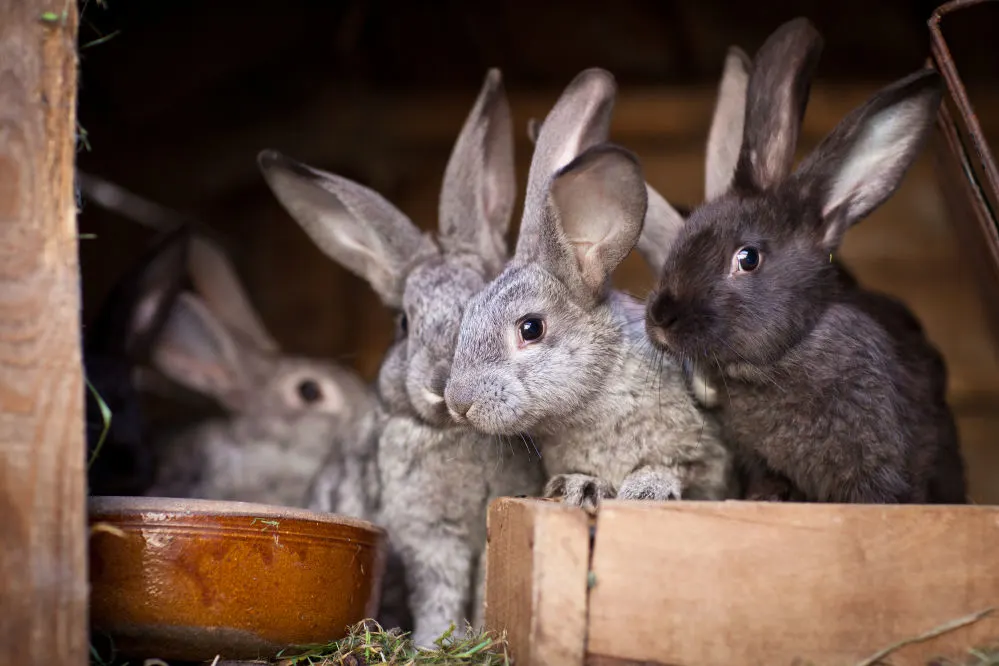
If you suspect your rabbit has eaten large quantities of sweet potato, it is best to consult your vet immediately.
Top Tip: To help you determine if your little hopper is struggling, it’s good to know what rabbit poop looks like.
Why a rabbit should not eat sweet potato
Sweet potatoes contain high volumes of starch and too much sugar. This makes it a potentially harmful food for rabbits, as it will cause excessive weight gain and potential gastrointestinal issues.
Baby rabbits, in particular, are more susceptible to problems related to diet and food. Sweet potatoes will be potentially more harmful to them. Adult rabbits may be able to resist some of the ill effects that sweet potatoes can cause.
There is also the outside chance that your rabbit (even an adult) may be completely intolerant to sweet potatoes. Signs that they may be having a bad reaction include bloating and lethargy or if they are experiencing diarrhea soon after eating it.
Oxalic acids can be harmful to a rabbit’s digestive system
Oxalates and oxalic acids and rabbits don’t mix too well, especially when consumed in high amounts. These compounds can be found in several foods like sweet potatoes, kale, beets, and rhubarb. Normally, they are not directly harmful by themselves, especially to humans. But they contribute to certain problems, especially concerning the kidneys.
In most cases, they are processed and discarded in urine. For a small animal like a rabbit, whose system may not be accustomed to consuming foods rich in them, they might cause problems.
This might especially occur if consumed in larger amounts over extended periods. Oxalic acids can ultimately damage a rabbit’s kidneys over time, so it’s best to give your bunny vegetables with these acids in small quantities.
Possible digestive issues from sweet potato
If a rabbit has eaten too much sweet potato, it may suffer from GI stasis, constipation, or diarrhea. If your rabbit’s bodily functions have become unusual (keep a close eye on its behavior), you may want to take action.
In the case of constipation, feeding your rabbit more alfalfa hay or timothy hay may assist in clearing its system. Note that if your rabbit has eaten a large portion of sweet potato, it’s best to see a vet as soon as possible.
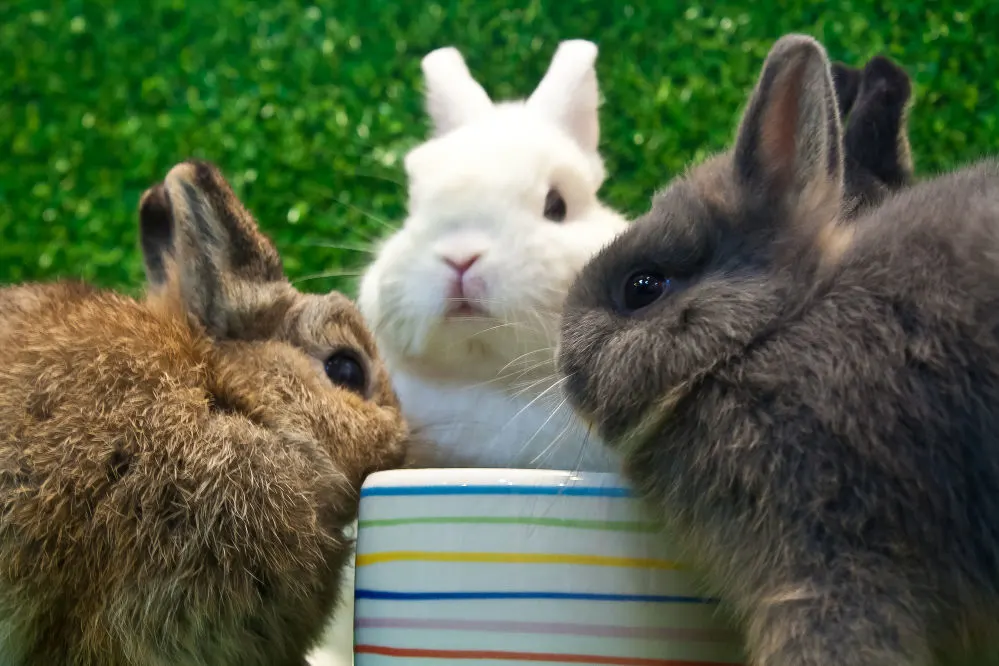
Side fact: Rabbits can’t throw up any problematic food, unlike humans. Ingested items that cause GI stasis or other digestive health issues will not sort themselves out.
Tooth decay
The high sugar content of sweet potatoes makes them agents of dental problems in rabbits. This is another reason why a sweet potato must be pretty infrequent on your rabbit’s menu.
Food rebellion
One of the more alarming consequences of feeding your rabbit too many sweet foods, like sweet potato, is that it can result in a food rebellion. That’s a funny way of putting it, but it means that your rabbit may start refusing to eat its regular food.
As you can imagine, that may be quite a serious situation. It would be better to maintain a steady and consistent diet of hay and formulated pellets, along with their daily salad of leafy greens.
It turns out that rabbits, too, can be fussy about what they eat. Since they are likely to love the taste of sweet potato, you may find a battle of wills on your hands.
Why a vet might suggest a bit of sweet potato for your rabbit
There is a special scenario in which a vet might suggest a little bit of sweet potato be fed to your rabbit. That would be if your rabbit is underweight and may need to fatten up. Even so, it would be small amounts over a short time period.
Not the whole sweet potato is equally harmful.
As mentioned, a rabbit may find a sweet potato very tasty. The good news is that while the sweet potato itself is normally better left to be avoided, some parts of the sweet potato plant are less harmful to your furry friend.
Sweet potato vines
The vines propagating from the sweet potato plant species might be a better option if you want to feed your rabbit another leafy treat. They are rich in protein and fiber and do not contain as many carbs and other bad nutrients as the potato itself.
There is one consideration. Before you feed this tasty new food to your pet bunny, make sure it is thoroughly washed. Bits of dirt, pesticide, or other contaminants may be present on the plant, which your rabbit may not respond well to.
Remember to limit feeding your rabbit sweet potato vines to small amounts.
Sweet potato leaves
Like the sweet potato vines, the leaves of the plant are a better alternative to the potato itself (in small amounts). The same conditions apply, though. Ensure the leaves are washed and cleaned from dirt and pesticides before feeding them to your pet rabbit.
Side fact: Some sweet potato plants actually flower! They are technically part of the same family as morning glories.
Sweet potato skin
The sweet potato skin is the part that contains the most fiber. However, even this nutritious part of the vegetable comes with dangers. It still contains lots of starch and carbohydrates. It may also contain bits of dirt that must be thoroughly washed off before offering it.
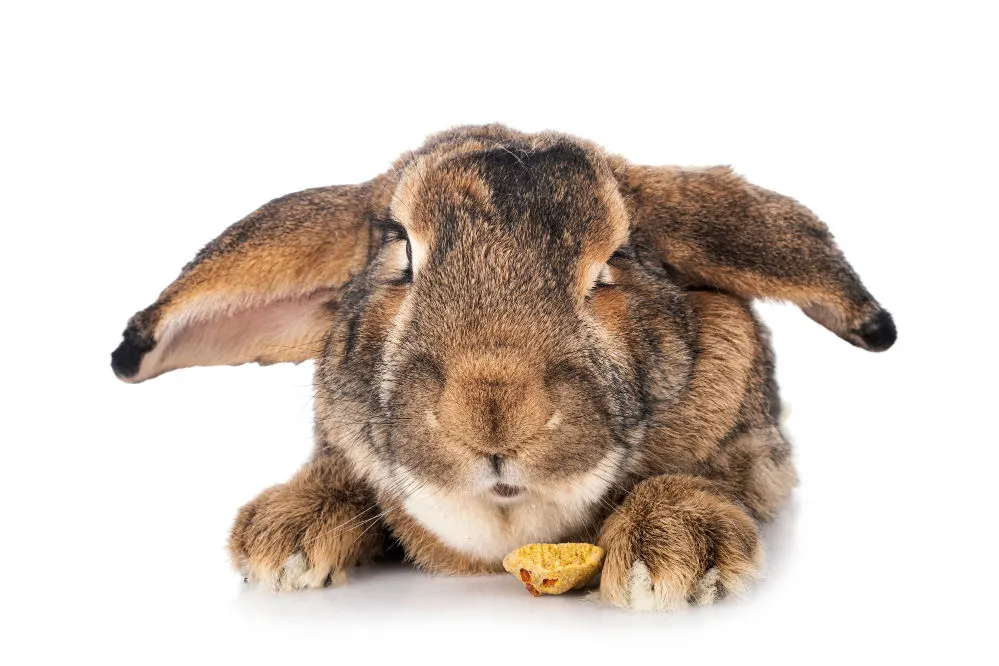
That said, offering your rabbit this treat seems risky when there are far better alternatives to try. Stick with a small bite of a juicy carrot for safety.
How much sweet potato can I give my rabbit?
If push comes to shove, the most sweet potato you can feed your rabbit at a time is a teaspoon, or 0.2 ounces (5.69 grams). This should only be a treat that’s given once in a blue moon unless under specific instructions from your vet.
Other (safer) leafy greens, fruits, and veg for your rabbit
These fruits and leafy vegetables are generally considered safer for your rabbit. Be careful, though, as they should still not represent more than 10% of your rabbit’s total diet. In most cases, ensure the fruit or veg is thoroughly washed, especially if it remains unpeeled.
- Banana slices — 0.5 ounces (14.17 grams) per five lbs (2.26 kg) of body weight.
- Bell peppers — can be mixed into their daily salad.
- Broccoli leaves — add to their daily salad.
- Brussel sprouts — can be fed as a weekly treat.
- Cabbage — you can mix it into their daily salad.
- Carrots — can be an occasional treat.
- Celery — mix half a celery stick into their daily salad.
- Mango — serves as an occasional tasty treat.
Tip: A classy rabbit feeder can help you keep track of how much your bunny eats and what they are eating.
Skip the sweet potato, and go with safer options instead
The nutritional benefits of sweet potatoes for humans are well-documented. Unfortunately, the same rules do not apply to your pet bunnies. It’s safer to avoid feeding your rabbit sweet potato altogether. That is to say, unless a vet specifically recommends it. In that case, it should still represent no more than 5% of its total diet.
For more tips, read this article on how to care for pet rabbits.
Steph Dyson is a travel journalist by trade but a lover of all small pets. She’s been a pet mum to everything from gerbils to guinea pigs, rabbits to hamsters, and fish to dogs of all shapes and sizes. She wants to share her years of experience with small pets and make Small Pet Guides the go-to website for pet owners seeking information and care advice.

